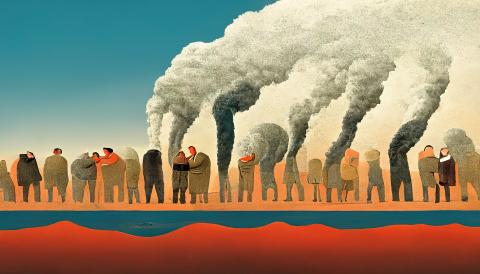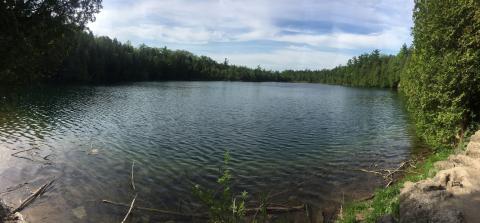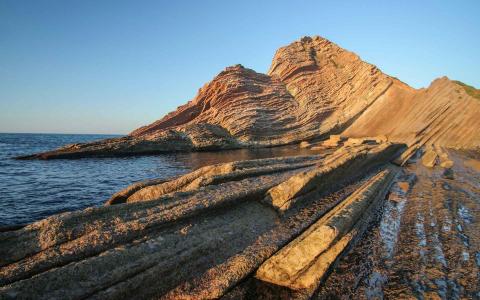Reactions to the 'New York Times' report that a commission of experts has rejected that the Anthropocene has begun
According to a report published yesterday in The New York Times, most of the members of the Subcommission on Quaternary Stratigraphy had rejected the proposal to declare the beginning of the Anthropocene, thus showing their opposition to the idea that this is a new geological epoch. Other sources told El País that the result of the vote was not formally confirmed. If this proposal is defeated, the process could be restarted from scratch at a later date.

Juan Carlos Gutiérrez - Antropoceno NYT EN
Juan Carlos Gutiérrez Marco
CSIC geologist and paleontologist at the Institute of Geosciences (CSIC-UCM)
The Anthropocene was proposed in the 1980s as a new geological epoch characterised by humanity's proven influence on the environment, but taken to the extreme assumption that humans had already 'taken the planet out' of its natural variability, which remained to be verified by indisputable scientific evidence archived in the sediments. This claim to make the Anthropocene the 'geological expression of global change' is all very well from an ideological point of view, but to become part of the body of study of the geosciences, it was necessary to be able to pass the rigorous scientific filters that are established for any candidate unit to be incorporated into the International Geological Table, something like a 'periodic table of the elements' that, in this case, affects formal units of geological record and time.
As in the case of the chemical elements cited as examples, each new proposal goes through a series of protocols subject to strict scientific controls in three successive expert commissions. In the case of the Anthropocene, a specific multidisciplinary working group was formed which, after 14 years of studies, decided in July 2023 to submit a specific proposal to the International Subcommission on Quaternary Stratigraphy, where the first step for its eventual approval was to be taken. But it is precisely this subcommission, chaired by the well-known anthropocenicist Jan Zalasiewicz, which has rejected the proposal in the first instance, and by a large majority: 12 votes against, four in favour and two abstentions, according to reports in the North American media; the voting of the remaining three members of the subcommission is unknown (null votes or votes not cast, if we discount the previous categories).
From my experience of eight years as vice-chairman of one of these sub-commissions, in which we approved five new Ordovician system floors, from the known data we can infer the neatness of the process, in which there was a clear call and the established deadlines were followed, otherwise there would not have been a vote.
From a geological point of view, we live in the Megalayense, which is the most modern level/age within the Holocene Series/Epoch, belonging to the Quaternary System/Period, within the Cenozoic Eratema/Era, of the Phanerozoic Eonotema/Eon. In my modest opinion, we also live in the Anthropocene, understood as the meta-concept that has been widely used in the humanities and social sciences, by artists, environmentalists, politicians, historians, geographers, philosophers, novelists... and also in our collective of geologists, since many geoscientists defend that the Anthropocene should be considered as a wide-ranging 'geological event', which began with the appearance of man on Earth, and which manifests itself as a diachronic affection of the physical environment in different continents, ecosystems and cultures.
Blanca Martínez - Antropoceno NYT EN
Blanca Martínez
Researcher in the geology department
Although official confirmation is still awaited, it has been leaked that the Subcommission on Quaternary Stratigraphy of the International Union of Geological Sciences (IUGS) has voted against the inclusion of the Anthropocene as a subdivision of the international chronostratigraphic table. This means that the term Anthropocene will not be part of the geological time table as it does not meet the requirements of the IUGS to represent a formal chronological boundary.
However, it does not mean that the geological community denies the human influence on the natural environment, amply demonstrated by multiple scientific evidences. These are different issues. The Anthropocene, as a concept, was defined to draw human attention to the effect of our actions on the natural balance of our planet and, as such, has not lost its validity. Possibly, this term will become a geological event like the hundreds of other events throughout the history of our planet, widely studied, known and used by the scientific community (for example, the Oceanic Anoxic Events of the Cretaceous or the Heinrich Events of the Quaternary), but whose name is not included in the table of geological times because they do not have enough entity to define any temporal subdivision.
Humanity has not ceased to know in which geological time it lives: the Upper Holocene. And this, for the time being, does not seem likely to change in the coming years, as the Anthropocene Working Group will probably be disbanded after this decision.



